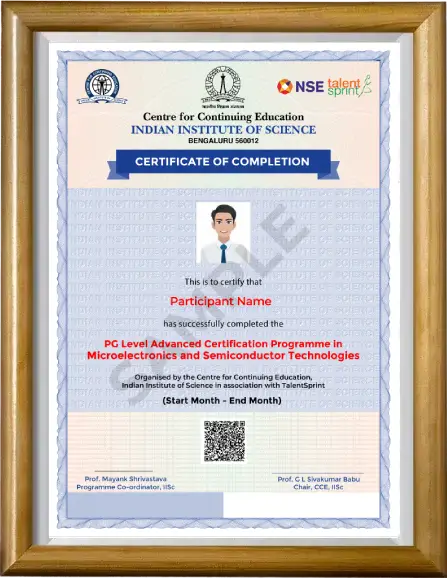Lead the Semiconductor Revolution
Advanced Certification Programme in Microelectronics and
Semiconductor Technologies
Course offered by TalentSprint in collaboration with CCE at IISc






The Advanced Certification Programme in Microelectronics and Semiconductor Technologies offered by TalentSprint in collaboration with CCE at IISc. CCE at IISc offers courses suitably designed to meet the requirements of various target groups - research & development (R&D) laboratories and industries, research scientists, and engineers- enabling them to grow into competent managers of technology-intensive and data-driven organisations. http://cce.iisc.ac.in
IISc (Indian Institute of Science) is the oldest and the finest higher education institute of its kind in India. It pursues excellence in research and education in several fields of Science and Engineering. It is one of the first three publicly funded institutes to be awarded the Institute of Eminence status. The alumni of IISc hold significant academic and industry positions around the globe. https://www.iisc.ac.in/.


Taught by an eminent IISc faculty member
 Programme Director
Programme DirectorWinner of 25+ National & International Awards | Author of 270+ Research Publications | Inventor in 60+ Patents
Professor, Department of Electronic Systems Engineering, IISc
Co-Founder - AGNIT Semiconductors Pvt. Ltd and Gallium Nitride Ecosystem Enabling Center (GaN Fab)
Research Expertise: Nanoelectronics, Power Semiconductors, Semiconductor Device Fabrication, Design, Modeling & Characterisation, Reliability Physics, On-Chip ESD Protection Design and Quantum Enhanced Technologies
Learning Outcomes
Learning Outcomes
Learning Outcomes
Learning Outcomes
Learning Outcomes
Learning Outcomes
Learning Outcomes
Learning Outcomes
Learning Outcomes
Learning Outcomes
Learning Outcomes
Note: These are edited versions based on the details submitted by various programme applicants.
Our programme offers two distinct tracks, each tailored to meet
different needs and goals.
Minimum Qualification: B.E./B.Tech Degree (ECE, EEE, EE, Instrumentation, Nanoscience/Nanotechnology, Material Science, Material Physics, Material Engineering and Semiconductor) or M.Sc. in Electronics or Physics.
It’s a simple 4-step process
 Apply for
Apply for  Submit
Submit  Await
Await  Join
Join  Master the art of designing and fabricating
Master the art of designing and fabricating
cutting-edge semiconductor devices
 Innovate electronics and electrical products that seamlessly
Innovate electronics and electrical products that seamlessly
integrate machines, workers, energy, material, and data
 Build and foster a team capable of designing and bringing
Build and foster a team capable of designing and bringing
to life nano-scale semiconductor devices
In addition to the program certification, get the opportunity to avail Level 1, Level 2 and Advanced Certification from the India Semiconductor Workforce Development Program (ISWDP) offered in collaboration between the Indian Institute of Science (IISc) and Synopsys Inc, USA, without additional fees (which otherwise costs 1.1 Lakhs + GST for industry professionals). For more details regarding ISWDP, please visit - https://iisc-iswdp.org/

Microelectronics and Semiconductor Technologies are enabling the creation of next-generation semiconductors, making systems faster, smaller and more energy efficient. With possibilities to improve and even revolutionize many technologies, Microelectronics is delivering immense value to IT, medicine, transportation, energy, food safety, environmental science, and many others. Some of the important developments listed here indicate the accelerating Microelectronics and semiconductor technologies industry growth.
This is the right time for professionals to gain a deep insight into designing, modeling, characterisation and development of semiconductor technology and tap into the promising opportunities that this sector offers.
The majority of professionals in the VLSI and semiconductor industry are often trained in VLSI design or circuit design principles, and in their design practice, they consider semiconductor devices as a black box. These design practices, which require one to follow thousands of design rules, don’t involve a first principal understanding of semiconductor technology.
This gap originates from the undergraduate and postgraduate training given at the majority of places, which lacks rigorous training on micro and nanoelectronics and device as well as semiconductor technology principles. While the black box approach may have worked for several generations, given the way technology is advancing, it is going to be difficult for working professionals to survive in this industry without understanding the fundamentals of devices and semiconductor technologies and the principles of micro and nanoelectronics.
The other aspect is the push for semiconductor fabs and production around the world. There will be around fifty new fabs in the next 5 years, possibly even more, and each fab would require thousands of semiconductor professionals. This means there will be demand for over one lakh new professionals in the next five years who understand semiconductor technologies. To enable professionals to navigate this change, The Semiconductor Industry is expected to reach $958.93 billion by 2030 ~ Mordor Intelligence, where aspirants can enhance their knowledge and build capabilities to thrive in the new semiconductor era.
This LIVE and interactive online programme has the potential to strengthen fundamentals, inform new industry developments and bridge the knowledge gap. Participants attending this programme can benefit from the following -
CCE-IISc Advantage